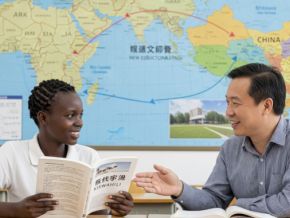- Kenya’s 2+2 program sends 20 students to Tianjin to train as Mandarin teachers for public schools.
- Kenyan lecturers co-wrote the syllabus and will sit on the graduation board in China next summer.
- Graduates will return to teach Mandarin in Kenyan classrooms under Kenyan payroll rules.
Kenya is broadening the African journey on reshaping the teaching of Mandarin—by taking control of curriculum design, producing its own teachers, and building a model that reduces dependency on Chinese faculty. The country’s first “2+2” Dual-Degree Scholarship Program, launched with Tianjin Normal University in 2023, gives Nairobi a seat at the table in deciding who studies, what gets taught, and how graduates return to classrooms at home.
When 22-year-old Brian Kibet hugged his father goodbye in the Confucius Institute courtyard on September 5, the farewell was filmed for later news bulletins. Viewers saw a farmer’s son from Nandi County clutching a one-way ticket to Tianjin. What they did not see was the bigger story: Kenya testing a home-grown route to Mandarin capacity.
Kibet is one of 20 University of Nairobi students heading to Tianjin under the program. The numbers are small; the symbolism is big. The December 2023 pact—between Nairobi University, Tianjin Normal and China’s Center for Language Education—does more than fund tuition and dorms. Kenyan lecturers co-wrote the syllabus, selected the cohort, and will sit on the graduation board in China next summer.
Officials are blunt about the goal. “These graduates will sit for the Teachers Service Commission licensing exam and walk straight into public schools,” said Carol Hunja, Secretary for Higher Education. In other words, Mandarin will be taught by Kenyans, in Kenyan classrooms, under Kenyan payroll rules—something French and German never managed here.
Kibet, majoring in Chinese with a Kiswahili minor, embodies the shift. “I want to translate our oral stories—like the Nandi legend of Kiprop—into characters my classmates in Tianjin can read,” he said before boarding. His father, Stanley Ng’etich, a maize farmer, admitted he had to Google “China” when the scholarship came through. Now he plans to sell part of his land to buy smartphones for the village school so pupils can video-call his son in Mandarin.
The cohort is carefully built: 14 women, 6 men; 13 from rural counties, 7 from Nairobi. Ages average 21. One speaks three languages already. All passed HSK-4—the Chinese proficiency most exchange programs set as a ceiling—before leaving Kenya. In Tianjin, they won’t just absorb lessons. Each must deliver a final-year teaching kit—textbook chapters, audio drills, cultural games—adapted to Kenyan secondary schools. These materials will be uploaded to Kenya’s curriculum portal, royalty-free, so the next wave of teachers can remix and localize them, even into Sheng.
Chinese diplomats praise the model; privately they call it a “reverse export.” Zhang Zhizhong, Beijing’s chargé d’affaires in Nairobi, called the dispatch “a critical milestone” because it lets Kenya seed Mandarin across East Africa without relying on Chinese faculty. At home, demand is surging. More than 2,000 Kenyans signed up for beginner Chinese at the University of Nairobi last year, up from 1,522 in 2023. Kenyatta and Moi universities report similar spikes.
The choke point is trained teachers—the very gap the Tianjin cohort is meant to close. Government planners say Kenya needs “several hundred” certified Mandarin teachers by 2030 to meet curriculum rollout targets. If Kenya succeeds, the impact could be watched across the continent. Uganda has trained more than 145 local Mandarin teachers; Ghana just launched a Chinese Language Teacher Training Center to serve West Africa; Zimbabwe has built a network of local lecturers and even published a Shona–Chinese dictionary. North African universities are embedding Mandarin alongside vocational skills. Kenya’s “2+2” pipeline, backed by TSC badges and digital fluency, could become a reference point.
Idriss Linge
